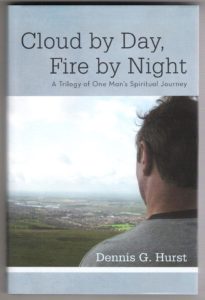In Flanders fields the poppies blow…
11 Sunday Nov 2018
Written by dennisghurst in Inspiration, Origins
Tags
Beyond the Cosmos, Christ, Christianity, Conservatism, Constitutional Republic, Donald Trump, Everlasting, Experience, Family, Fellowship of the Minds, Freedom, Genealogy, God, Jerusalem, Jesus Christ, Let Freedom Ring, Liberty, Life, Posterity, Teaching, United States, Wisdom
Share it
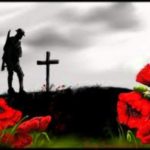
At the 11th minute of the 11th hour of the 11th day of the 11th month, we pause in memory of the millions of men and women who sacrificed their lives in military service to preserve “life, liberty, and the pursuit of happiness” for future generations.
It is now our turn.
The first poppies from Flanders fields were distributed around 1920, inspired by a poem written by a Canadian soldier during the Battle of Ypres in 1915.
Lt. Col. John McCrae wrote the poem In Flanders Fields on seeing poppies growing beside a grave of a close friend who had died in battle. The poem inspired countries around the world such as the United States, Canada, France, Britain, Australia and New Zealand to adopt the poppy as the flower of remembrance.
Today, the volunteer donations from the distribution of millions of poppies go toward supporting ex-servicemen and women.
Yours truly, like millions of others, had uncles and neighbors in WWI with lasting memories of comrades lost, and parents and uncles in WWII with memories better hidden than revealed.
Lest we forget…
More on the history of “Flanders Fields” …
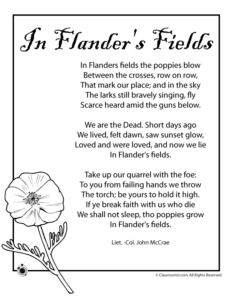
McCrae’s “In Flanders Fields” remains to this day one of the most memorable war poems ever written. It is a lasting legacy of the terrible battle in the Ypres salient in the spring of 1915.
Although he had been a doctor for years and had served in the South African War, it was impossible to get used to the suffering, the screams, and the blood; Major John McCrae had seen and heard enough in his dressing station to last him a lifetime.
As a surgeon attached to the 1st Field Artillery Brigade, Major McCrae, who had joined the McGill faculty in 1900 after graduating from the University of Toronto, had spent seventeen days treating injured men – Canadians, British, Indians, French, and Germans – in the Ypres salient.
It had been an ordeal that he had hardly thought possible. As he later wrote of it: “I wish I could embody on paper some of the varied sensations of that seventeen days… Seventeen days of Hades! At the end of the first day if anyone had told us we had to spend seventeen days there, we would have folded our hands and said it could not have been done.”
One death particularly affected McCrae. A young friend and former student, Lieut. Alexis Helmer of Ottawa, had been killed by a shell burst on 2 May 1915. Lieutenant Helmer was buried later that day in the little cemetery outside McCrae’s dressing station, and McCrae had performed the funeral ceremony in the absence of the chaplain.
The next day, sitting on the back of an ambulance parked near the dressing station beside the Canal de l’Yser, just a few hundred yards north of Ypres, McCrae vented his anguish by composing a poem. The major was no stranger to writing, having authored several medical texts besides dabbling in poetry.
In the nearby cemetery, McCrae could see the wild poppies that sprang up in the ditches in that part of Europe, and he spent twenty minutes of precious rest time scribbling fifteen lines of verse in a notebook.
Amazingly, it was almost not published. Dissatisfied with it, McCrae tossed the poem away, but a fellow officer retrieved it and sent it to newspapers in England. The Spectator, in London rejected it, but Punch published it on 8 December 1915.
It was a young soldier who watched him write it. Cyril Allinson, a twenty-two year old sergeant-major, was delivering mail that day when he spotted McCrae.
The major casually looked up as young Allinson approached, then went on writing as the sergeant-major stood there quietly. “His face was very tired but calm as he wrote,” Allinson recalled. “He looked around from time to time, his eyes straying to Helmer’s grave.”
When McCrae finished five minutes later, he took his mail from Allinson and, without saying a word, handed his pad to the young NCO. Allinson was moved by what he read:
“The poem was exactly an exact description of the scene in front of us both. He used the word blow in that line because the poppies actually were being blown that morning by a gentle east wind. It never occurred to me at that time that it would ever be published. It seemed to me just an exact description of the scene.”
The rest, as the saying goes, is history…
********************

Soli Deo Gloria!

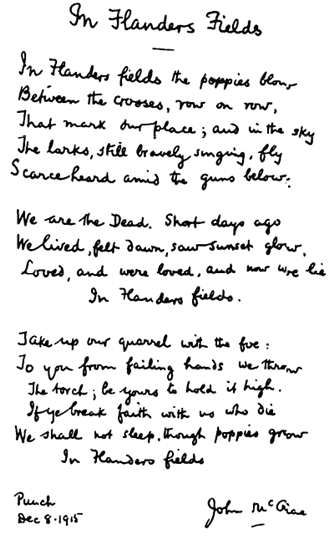
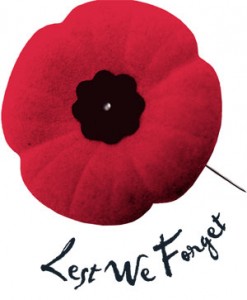
 Link To DennisGHurst.com
Link To DennisGHurst.com
